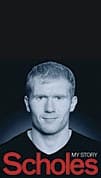 My Story
My Story
by Paul Scholes
Simon & Schuster, £19.99
Reviewed by Paul Campbell
From WSC 299 January 2012
In the first sentence of his foreword to Paul Scholes's autobiography, Alex Ferguson calls the player dour. You can only assume Ferguson has read the book. The United manager doesn't publish his players' autobiographies, but if he did, they would all read like this – like a press release from MUTV. Scholes spends 300 pages telling us things we already know.
What makes the book such a disappointment is that Scholes should have so much to say. He only played at one club for one manager, but did so in a period when football changed unrecognisably and his club transformed completely. Scholes either glosses over or misses out the stories that could make the book interesting. We hear nothing about the night Eric Cantona kicked a supporter, the scene in the dressing room when Ferguson kicked a boot into David Beckham's face, or when Roy Keane was dismissed from the club for criticising his team-mates. He was the most naturally gifted player in any team he played, but makes no mention of how he played the game.
There is no snippiness, no one he doesn't like and not even a grain of controversy. David Gill is "a nice guy"; Beckham is "a really nice guy"; José Mourinho is "a personable guy"; and Wayne Rooney "loves his banter". Scholes even likes Liverpool fans. Apparently they are "classically witty people; humour comes so naturally to them".
Scholes opts to tell his life story in a series of picture captions. The glorified photo-album approach might seem lazy at first, but after a hundred pages, the lack of text is a relief. Winning the League is "absolutely fabulous". Lifting the FA Cup is "downright fantastic!". "Come on, somebody please wake me up," says Scholes. The readers could say the same.
He saves his opinions for the most innocuous of subjects. Beneath a photo of Scholes in a long-sleeved shirt he informs us: "I don't like playing in long-sleeved shirts." Beside a photo of him with stubble he says: "I never grow a full beard." And after scoring a hat-trick at Wembley he tells us: "You might say I went home happy!"
His shyness is the only aspect of his character revealed in the writing. Scholes feels embarrassed when lifting trophies. Interviews are a big worry for him. And he doesn't like wearing United's "fancier" kits. He seems to take a perverse pleasure in his dullness. Beside a photo of Scholes in a suit he writes: " I really liked this one. It's just like me – nice and plain."
The book is interminably dull, but it is not without a heart. By the end it is quite clear that Scholes is a decent, modest man who is popular with everyone. The words "agent" and "money" go unmentioned. The closest he comes to talking about wealth is when he expresses thankfulness that football has secured the futures of his children.
Scholes is, above all else, a family man. He quit playing for England as he couldn't bear to be away from his children and his only regret about United's Champions League win in 2008 was that his third child was too young to join the celebrations. He will be remembered by many – Zinedine Zidane, Xavi Hernández and Ryan Giggs among them – as the greatest player of his generation. But if you must buy the autobiography of a former United player this Christmas, try Gary Neville's.